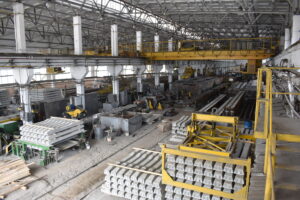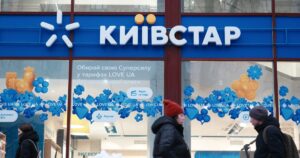
According to preliminary data, the FED aircraft manufacturing company (Kharkiv) ended 2025 with a net profit of UAH 187.58 million, which is 3.4% more than in 2024.
According to the agenda of the company’s general meeting of shareholders on March 12, UAH 45 million, or 24% of the profit, is planned to be allocated for the payment of dividends, and UAH 142.58 million will remain undistributed.
The dividend payment period is scheduled for April 1 to December 31, 2026.
According to the National Securities and Stock Market Commission (NSSMC) of Ukraine for the fourth quarter of 2025, more than 98% of the shares of FED JSC are owned by the company’s director, Viktor Popov.
As reported, at the end of 2024, FED JSC allocated UAH 40 million of its net profit of UAH 181.41 million to dividends, at a rate of UAH 4,575 per share with a par value of UAH 57,900.
The company’s authorized capital of UAH 506.162 million is divided into 8,742 thousand ordinary registered shares. As of October 1, 2025, retained earnings amounted to UAH 1.52 billion.
At the meeting, shareholders also plan to consider the re-election of the supervisory board, which currently consists of three members (including its chairman, Valery Fadeev).
In addition, the agenda includes the approval of SOVA Audit Firm LLC, selected on a competitive basis, to audit the annual financial statements of FED JSC for 2025.
JSC FED is one of Ukraine’s leading enterprises. It specializes in the development, production, maintenance, and repair of aviation, space, and general engineering equipment.
The average number of full-time employees as of October 1, 2025, was 953.
As reported, in January-September 2025, the company’s net profit increased by a quarter to UAH 176 million, and net income by 32% to UAH 774.9 million.
In 2024, the plant reduced its net profit by 43% compared to the previous year, to UAH 181.4 million, while its net income fell by 26%, to UAH 831.7 million.

The Korosten Reinforced Concrete Sleeper Plant (ZBSH Plant, Zhytomyr Region), which is part of Ukrzaliznytsia, increased its net profit by 7.4 times in 2025 compared to 2024, to UAH 47.1 million.
According to the company’s financial statements in the information disclosure system of the National Securities and Stock Market Commission (NSSMC), net income for the past year increased by 11.8% to UAH 478.2 million.
The plant received UAH 93.7 million in gross profit (3.9 times more), and operating profit increased 7.4 times to UAH 59.9 million.
At the same time, the report notes that in the fourth quarter of 2025, the company received net sales revenue of UAH 167.47 million, which is UAH 104.77 million (2.7 times) more than planned, but UAH 8.75 million (-5%) less than in the same period of 2024, due to a decrease in orders for reinforced concrete products.
Korosten ZBS specializes in the production of reinforced concrete sleepers, switch beams, and mobile modular shelters.
Production capacity utilization is 95% dependent on orders from Ukrzaliznytsia.
At the beginning of 2026, the plant had 363 employees, with an average monthly salary of UAH 34,900.
In 2024, the company produced 269,810 sleepers and 80 sets of switch beams. Its net income decreased by 10% compared to the previous year, to UAH 427.8 million, while net profit increased 4.6 times, to UAH 6.3 million.

Centravis Production Ukraine (Nikopol, Dnipropetrovsk region), part of Centravis Ltd., produced 13.77 thousand tons of seamless stainless steel pipes in 2025, compared to 13.7 thousand tons in 2024, while in 2023–2024, the company’s annual production growth rate reached 12%.
As Centravis CEO Yuriy Atanasov said during an online press conference on Friday, Nikopol is currently under constant shelling.
“We continue to work in these difficult conditions. And production at the level of almost 14 thousand is an incredible victory. We are improving our financial position and reducing our credit position. We are raising salaries, and the average salary in the company has now reached UAH 39,000,” the CEO said.
According to him, in 2025, the company increased its export share from 90% to 96% and supplied more than 13,000 tons of seamless stainless steel pipes to world markets.
According to the press release, among Centravis’s contracts are cooperation with GE Steam Power, a division of General Electric specializing in equipment for steam power and industrial energy systems; a contract with Ellimetal NV, a Belgian company that processes and supplies high-tech metal solutions for heat exchange and industrial equipment; a contract with RFF Rohr Flansch Fitting, under which Centravis won the competition with leading European manufacturers and supplied pipes for the overhaul of a heat treatment furnace at the Voestalpine Donawitz plant (Austria), as well as a number of other projects.
The main focus is on maintaining and strengthening positions in the global market, working with high-tech customers, and implementing complex engineering solutions.
“For us, it’s not about quantity, but quality. We don’t compete with cheap Indian or Chinese pipes. Our priority is marginal projects with complex technical solutions and increased quality requirements. In this segment, we are able to compete with leading European and American manufacturers,” Atanasov emphasized.
He also recalled that in 2025, Centravis traditionally participated in key global industry events, including Adipec 2025 in the UAE and Made in Steel in Milan.
The press release also states that the economic results of 2025 enabled the company to increase investment in production, fulfill its social obligations, and contribute to Ukraine’s sustainability. Last year, investments amounted to UAH 159.6 million (+13.5%); the amount of taxes and fees paid increased by 24% to UAH 680.8 million; and funding for philanthropic projects reached UAH 11.5 million.
“We hope that 2026 will bring Ukraine lasting and just peace, and we will be able to focus on rebuilding the country, developing production, and exporting products made in Ukraine,” Atanasov concluded.
According to Centravis CFO Alexander Joseph, EBITDA in 2025 amounted to EUR 12 million, which is twice as much as in 2024.
As reported, the company planned to increase production to 15,000 tons in 2025.
Centravis was founded in 2000 and is one of the ten largest manufacturers of seamless stainless steel pipes in the world. Its main production facilities are located in Nikopol (Dnipropetrovsk region). In 2023, a branch of the company opened in Uzhhorod.
Centravis Ltd. was created on the basis of Nikopol Stainless Steel Pipe Plant CJSC and the service and trading companies of YVIS Production and Commercial Enterprise LLC. Its shareholders are members of the Atanasov family. Centravis Ltd. owns 100% of the shares of PJSC “Centravis Production Ukraine.”

According to the results of 2025, Kyivstar, Ukraine’s largest mobile operator, increased its revenue and EBITDA by 24-26%, exceeding the forecast announced in November 2025, according to a press release from telecommunications holding company VEON, the main shareholder of Kyivstar Group with an 89.6% stake.
According to preliminary unaudited estimates, capital expenditures in 2025 are expected to be in the range of 29-31% of revenue.
VEON expects the results to exceed the 2025 forecast published on November 10, 2025, along with the financial results for the third quarter of 2025, the release said.
As reported, Kyivstar served 22.5 million mobile subscribers in the third quarter of 2025, down 3.6% from the previous year, while the number of 4G customers grew by 2.4% to 15 million.
In the third quarter of 2025, the company’s EBITDA was UAH 7.1 billion, which is 21.5% more than in the third quarter of 2024, and in dollars, the growth was 20.4% to $171 million.
In the first half of 2025, Kyivstar increased its EBITDA by 32% to $06 million, while its revenue grew by 28% to $539 million.
In August 2025, Kyivstar Group Ltd. (Nasdaq: KYIV) announced the completion of its listing on the Nasdaq Stock Market LLC (Nasdaq) and the start of trading in the shares of the largest mobile operator Kyivstar under the ticker KYIV.

According to the results of 2025, the state-owned enterprise “Forests of Ukraine” received UAH 29.9 billion in revenue, UAH 8.4 billion in pre-tax profit, and 23% profitability, said the general director of the state-owned enterprise, Yuriy Bolokhovets, on Facebook.
He specified that “Forests of Ukraine” paid UAH 15.8 billion in taxes in 2025, which is 44% of its revenue and is the highest percentage in the forestry and woodworking industries.
“For the first time since independence, billions in profits from timber sales have not been diluted by shadow schemes and divided between officials and intermediaries, but have been directed entirely to the budget. This is an indisputable fact. Numbers are stubborn things, and they make it possible to evaluate the work of an enterprise on the basis of objective figures rather than subjective judgments,” Bolokhovets wrote.
The CEO expressed confidence that the growth in indicators is largely due to de-shadowing, as the product sales system is now as open as possible. The state-owned enterprise “Forests of Ukraine” publishes information on each exchange transaction: who contracted what volume of timber and at what price. A list of product refusals is also published.
In 2025, the state-owned enterprise transferred 100% of its procurement of harvesting services to Prozorro. However, due to a shortage of personnel, contractors often do not have time to complete the work. Therefore, additional teams are being formed throughout Ukraine and new vacancies for loggers are being opened.
According to his information, “Forests of Ukraine” plans to increase harvesting volumes in 2026. To this end, the procurement of special equipment has already been launched: harvesters, forwarders, skidders, tractors, trailers, and equipment for transporting timber. Currently, the state-owned enterprise “Forests of Ukraine” is working to double its investment plan for 2026 in order to increase the pace of harvesting.
“We are determined to offer the market the largest volume of forest products since the start of the full-scale war. We expect an additional million cubic meters thanks to the acceleration of the approval of forest management materials. We expect another million cubic meters from the deregulation of licensing procedures. Changes to the regulatory framework are being developed, but unfortunately, the decision has not yet been made,” Bolokhovets said.
In 2026, the state-owned enterprise “Forests of Ukraine” also plans to increase investments in forest protection, conservation, and reforestation, focusing on the care of forest crops to ensure a high-quality timber market in the future. The recreation development program will continue.
Bolochovets added that the state-owned enterprise’s plans for 2026 include restarting the implementation of an automated ERP management system and continuing the corporatization process, which involves revaluation of property, inventory, and preparation of transfer deeds. The registration of property rights to land will be completed. The enterprise will also work on incorporating forest users who are unable to fully perform their functions into its structure.

The national postal operator Ukrposhta received a net profit of UAH 257.9 million in the fourth quarter of 2025, which is 69.2% more than in the same period in 2024, according to the company’s interim report.
“The net profit target was exceeded, while the net income and EBITDA targets were not met, thanks to additional income from the sale of the company’s property, which amounted to UAH 168 million against a target of UAH 46 million,” the document states.
According to the report, Ukrposhta increased its revenue in the fourth quarter by UAH 10.7 million compared to the same period in 2024, to UAH 3 billion 601.6 million, but this was UAH 676.0 million less than planned.
The company explained that compared to the same period last year, there was an increase in revenue from the delivery of written correspondence, trade, and other commercial services, while other services saw a decline in revenue.
EBITDA for the reporting period increased by 49.7% compared to the fourth quarter of 2024, reaching UAH 461.5 million, but according to the plan, it should have amounted to UAH 591.1 million.
It is noted that in the fourth quarter of 2025, the company accepted 20.5 million domestic and international letters (22.7 million in the same period of 2024), 11.8 million parcels (13.3 million), and 21.5 million (23.3 million) payments.
According to the report, Ukrposhta currently has 5,100 stationary points (5,200 in the fourth quarter of 2024), which serve 11,100 service points, 2,000 mobile points (2.1 thousand in Q4 2024), which serve 20.13 thousand service points.
The average number of full-time employees in Q4 2025 was 26.6 thousand (28.9 thousand in Q4 2024), and the average salary was UAH 18,800 (in Q4 2024 – UAH 17,800), according to the report.
Also, during the fourth quarter, the company launched a network of the first 100 automatic post office machines in Kyiv and Odesa, updated its mobile application and CRM system. In addition, the company’s branches began accepting payment for goods with the Natskeshbek card.
According to the report, Ukrposhta’s plans for 2026 include investing in digital systems, in particular expanding the functionality of the mobile application, CRM systems, and others. It also plans to expand new parcel terminals in the regions and optimize delivery routes, strengthen operational activities, and enhance its cybersecurity program.
As reported, in the third quarter of 2025, Ukrposhta increased its losses by 10.4% compared to the same period last year, to UAH 151.8 million, with a 6.2% decrease in revenue, to UAH 3 billion 18.1 million, while EBITDA amounted to UAH 100.4 million compared to UAH 298.6 million in the same period of 2024.
In the first half of 2025, the company increased its revenue by 5.4% compared to the same period last year, to UAH 6 billion 505.0 million, reducing its net loss by 27.2% to UAH 311.8 million.